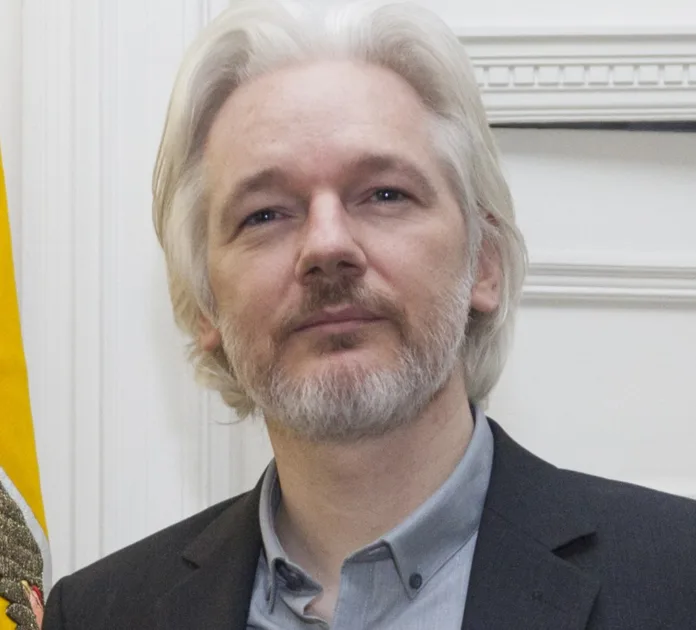WikiLeaks founder Julian Assange secures release from UK prison, travels to Saipan under us plea agreement after a decade-long legal battle
Julian Assange, the controversial founder of WikiLeaks, embarked on a pivotal journey from Belmarsh prison in the United Kingdom to Saipan, a US territory in the Pacific. His departure followed a complex legal saga spanning over a decade, characterized by extradition battles and contentious allegations of espionage and data breaches.
Assange, 52, boarded a chartered private jet from Stansted Airport, funded by $500,000 he raised, bound for Saipan’s capital, the Northern Mariana Islands. This journey marks a significant turn in his legal fortunes, as he reached an agreement with US authorities to plead guilty to a single count of conspiracy related to the acquisition and disclosure of national defence information. In return, Assange is set to be sentenced to time served—62 months spent in a British prison.
Embed from Getty ImagesThe decision to travel to Saipan, a US commonwealth, for the plea and sentencing hearing reflects Assange’s concerns about facing trial in mainland US courts, where he has vehemently opposed extradition due to fears of unfair treatment and potential life imprisonment. Throughout his incarceration in Belmarsh, Assange’s case has garnered international attention, igniting debates about press freedom, government transparency, and the rights of whistleblowers.
Support for Assange has been vocal and widespread, particularly from his wife, Stella Assange, and advocates who have championed his cause for years. Stella Assange, along with their children, celebrated his release from Belmarsh, emphasizing the emotional toll of his prolonged detention and the relief of his imminent return to Australia, his country of birth.
Assange’s legal troubles began in earnest in 2010 when WikiLeaks published classified US government documents, including diplomatic cables and military files leaked by former US Army intelligence analyst Chelsea Manning. The disclosures sparked global controversy, with US authorities accusing Assange of endangering lives and compromising national security. This led to a protracted legal battle that saw Assange seeking asylum in the Ecuadorian Embassy in London for seven years to avoid extradition.
The resolution of Assange’s case underlines the intersection of law, politics, and human rights. It prompts reflection on the limits of journalistic freedom and the protections afforded to whistleblowers in the digital age. As Assange prepares for his court appearance in Saipan, the outcome will shape not only his personal future but also broader discussions on transparency in governance and the role of media in holding power to account.
Analysis:
Political Perspective: Julian Assange’s journey from imprisonment in the UK to plea agreement in Saipan has significant political implications. It underscores the complexities of extradition law and international relations, particularly between the US and its allies. The decision to settle in Saipan rather than face trial in the mainland US reflects Assange’s strategic legal manoeuvring and highlights concerns over fair treatment under US jurisdiction. Politically, Assange’s case has divided opinions globally, with some viewing him as a champion of free speech and others as a threat to national security.
Social Perspective: From a societal standpoint, Assange’s case raises profound questions about the limits of transparency and accountability in the digital era. His WikiLeaks platform has been lauded for exposing government secrets and fostering public debate on issues of governance and civil liberties. However, his legal battles also highlight the risks and repercussions faced by whistleblowers who challenge powerful institutions. The public discourse surrounding Assange’s actions and their societal impact continues to shape attitudes towards journalistic ethics, government oversight, and the right to information.
Racial Perspective: The racial perspective in Assange’s case intersects with broader themes of justice and fairness in legal proceedings. While Assange’s case primarily revolves around political and diplomatic concerns, discussions on racial justice within the context of his extradition and treatment in the legal system remain peripheral. However, the global attention on his case does reflect broader debates on equality before the law and the equitable application of legal standards across diverse populations.
Gender Perspective: Assange’s legal battles and his eventual plea deal in Saipan do not prominently feature gender-specific issues. The focus has predominantly been on issues of press freedom, government transparency, and whistleblower protections. Gender dynamics in Assange’s case have not been a central point of analysis or contention, reflecting the broader narrative dominated by legal, political, and human rights considerations.
Economic Perspective: Economically, Assange’s legal saga has implications for the cost of legal proceedings, international diplomacy, and media regulation. The resources expended on extradition proceedings, security arrangements, and diplomatic negotiations underscore the financial stakes involved in high-profile legal cases with international dimensions. Furthermore, the impact on media freedoms and corporate responsibilities in handling sensitive information highlights broader economic considerations within the digital information ecosystem.
